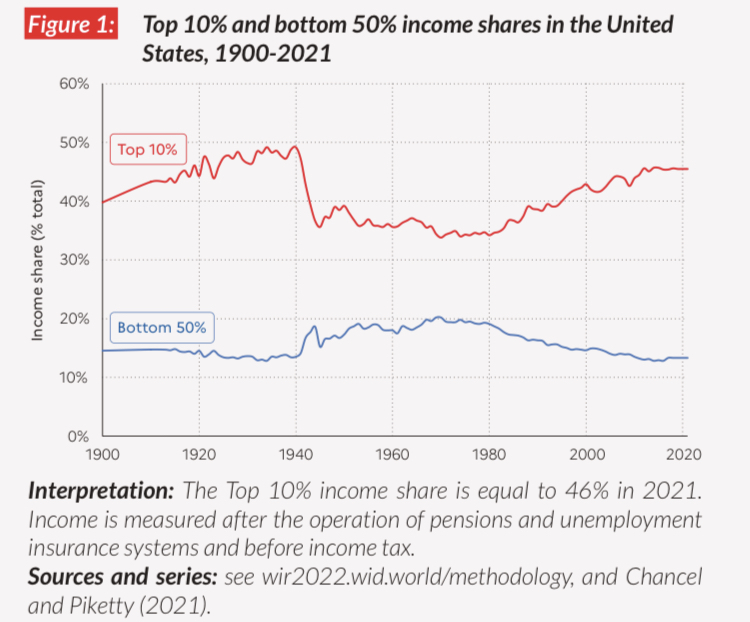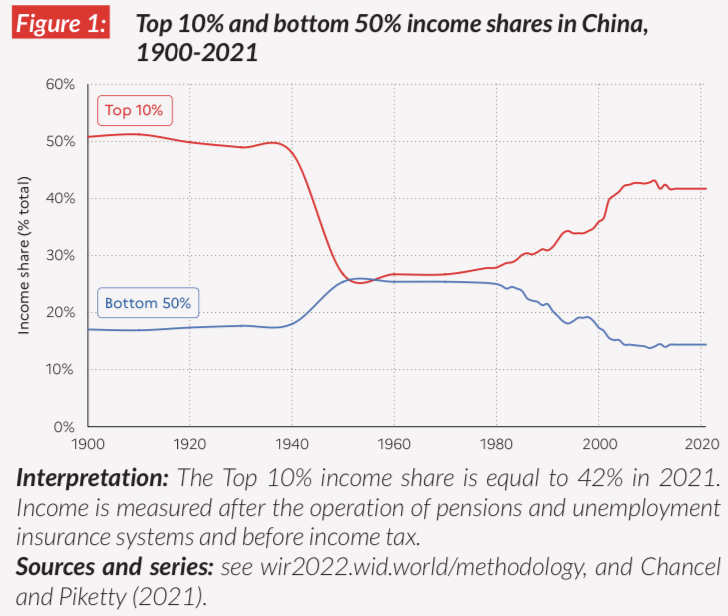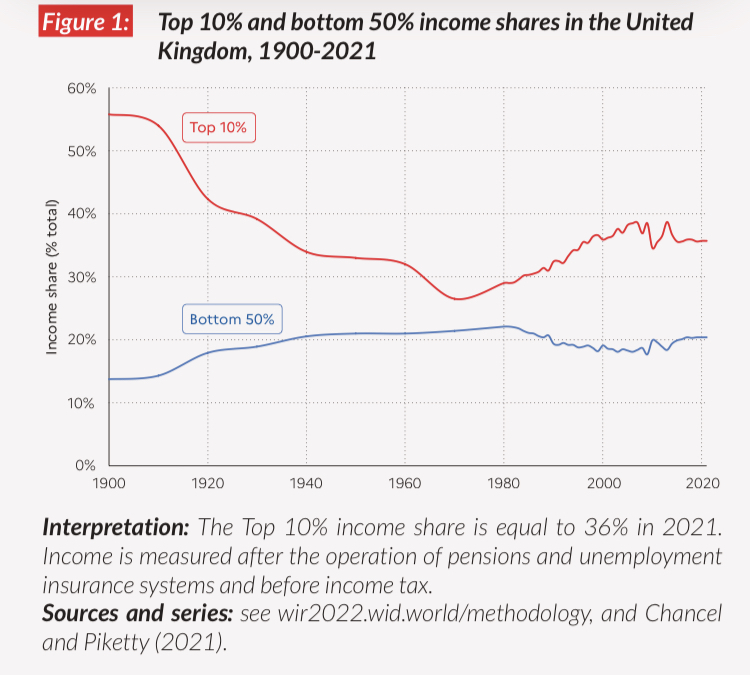- cross-posted to:
- communism@lemmygrad.ml
- cross-posted to:
- communism@lemmygrad.ml
Source: Piketty's World Inequality Report 2022
I shared this deep in a dunk thread earlier and figured there's probably many comrades who haven't seen this data. I think it's very good rhetorically because a lot of libs have an incredibly vibes-based impression that the Soviet Union was just an Animal Farm old-boss-same-as-the-new-boss situation.
Instead, this demonstrates that Russia underwent one of the most dramatic inversions of income inequality of any country in recorded history.
For comparison here is the US over the same time period:
Show


China:
Show


And the UK:
Show



deleted by creator
The USSR in its prime was able to challenge the USA on a lot of moral issues that would have never been brought up by other powers. For instance, I'm pretty sure that civil rights was not able to progress as it did without the ability for the USA to be shamed into action.
That said, both China and Russia seem like they are near pre-revolution levels of income disparity right now. So, I don't know who would be the standard bearer pushing for economic equality now.
deleted by creator
It's disappointing but necessarily surprising tbh. China has been doing state capitalism for a while now.
As for your question these statistics aren't necessarily contradictory to the idea of extreme poverty being reduced/eradicated. As this is basically a measure of wealth inequality, and while it might be worse than pre revolution, the standard of life is undoubtedly much higher. This is a result of China's explosive economic growth, there is simply way more wealth in China than ever before. So a higher wealth inequality isn't necessarily a good indicator of poverty. It is however an apt representation of the CCP's economic policies over the past two decades and is a good indicator that poverty will rise once China's growth slows down if wealth inequality isn't addresed.
deleted by creator
no
“State capitalism” is not an inherently bad thing and is or can be depending on the situation necessary along the road to socialism or communism. Here’s a good essay from Lenin 1918, speaking regarding the Soviet Union but a lot of the conceptual stuff is relevant to China as well. https://www.marxists.org/archive/lenin/works/1921/apr/21.htm
I am well aware, I am a Marxist and Leninist I just disagree about whether or not china is a socialist state using state capitalism, or if its a capitalist state doing state capitalism
In my opinion, China is not a socialist state, it is a removedd workers state which uses state capitalism and has the good sense to plan for the future.
That said, I don't really go after china that much because it 1.) doesn't matter if I don't like china, I can't affect it and its destroying my country (good) 2.) its in second place on the "least bad global superpowers" list
I do hope I'm wrong and owned and china saves the world, though
edit: for context for the part that got removed was the opposite of generated, though I do approve of it being in the slur filter this is the actually descriptive use of the word
If you're an ML, you should understand that state capitalism abhors having a genuine, independent capitalist class running private industries. If we need to put a precious label on it that isn't one China uses, "market socialism" makes more sense.
As Lenin explains in that text, state socialism in the proper sense (as a dominant mode of production and not just a nascent or vestigial element) is oriented around the monopolization of the means of production by the state and the use of careful, deliberate planning of production, which independent profiteering interferes with.
I disagree with this model as anything but a wartime measure, and Lenin himself turned on it somewhat. It is apparent from Soviet history that it produced bureaucratization in the state, however much it kept down inequality prior to the market reforms, and I think China's system of having a private capitalist class is in that way better for avoiding bureaucratization because it separates industrialists from the levers of state power in the case of private industries.
Now, is China compromised anyway? It's honestly more likely than not, but the question of why is seemingly much more complicated than what has been said here so far and I frankly don't really understand it.
For what it's worth, I agree with you. I think Hexbear could stand to take two stances at the same time: one that appreciates what China has done as a pragmatic and forward-planning nation, as well as one that recognizes that in a lot of ways China diverges from what the Marxist ideal is. Most of us do understand this, of course, and recognize that many of these points of divergence were necessary for modern China to survive, but I still think a critical lens could generate some good discussion.
Who's in first place?
the USSR obviously, although of its latter days I am not a fan its really absurd to suggest otherwise imo
I don't know's on second
What's on third
I'd also be curious about the data the graph is drawing from and how large and diverse of a pool it's pulling from year-by-year
Uhhhh China's life expectancy pre revolution was 33 years old. There is absolutely zero comparison between China of today and the humiliation years of hyper exploitation by the British, Americans, Japanese and so on.
wonder how those stats are calculated. The bottom 50% in 1930s China were literal serfs with a life expectancy of 30 doing borderline slavery to feudal landlords. Are we really gonna pretend they owned like 20-30% of the country's income share ? What does that even mean or matter in a feudal context
Not least because it means you're not allowed to own and exploit the resources of that country any more
I've seen this analysis presented before. I think there was a study published about it, or maybe I'm misremembering where I saw it.
It's a great point to make.
You also benefit from coming out of world war two relatively unscathed and in position to rebuild Europe.
I’m not sure the graphs support that conclusion by themselves. The dip in US top 10% occurred simultaneously with Pearl Harbor and the US joining WWII, not the formation of the Soviet Union. For the UK it likewise seems tied to World Wars I and II and decolonization. For WWI it makes sense that it did not impact the US quite as much, especially since the US in fact was a financier of the European nations, and was notoriously unforgiving of war debts. Michael Hudson has argued this debt a major factor in provoking the buildup of Nazi ideology in Germany as France and England directly and indirectly required all of those debts to come from Germany.
The measure in these graphs is inequality of income rather than of wealth. Perhaps nationalization of production during wartime is the causal factor? Unemployment goes way down as people go off to fight or are employed in war manufacture. In any case it’s hard to separate the influences of war and political system on this data.
correlation doesn't mean causation